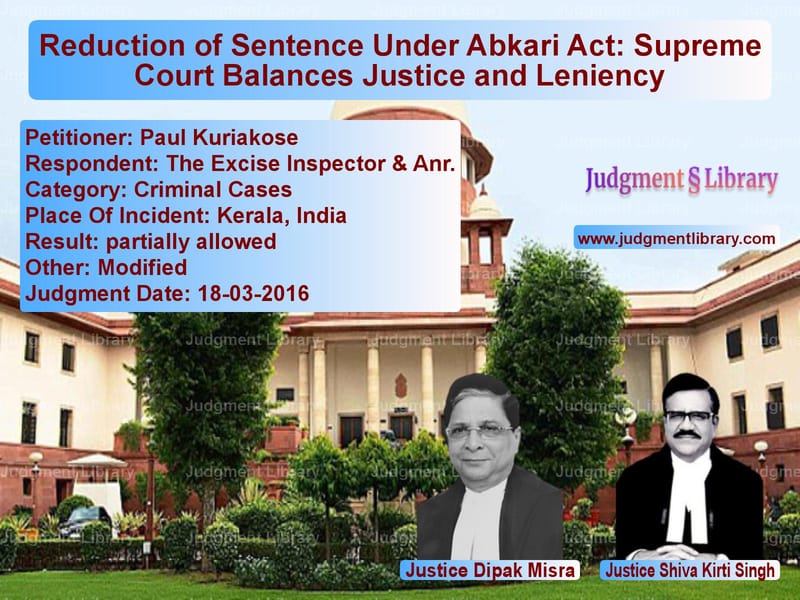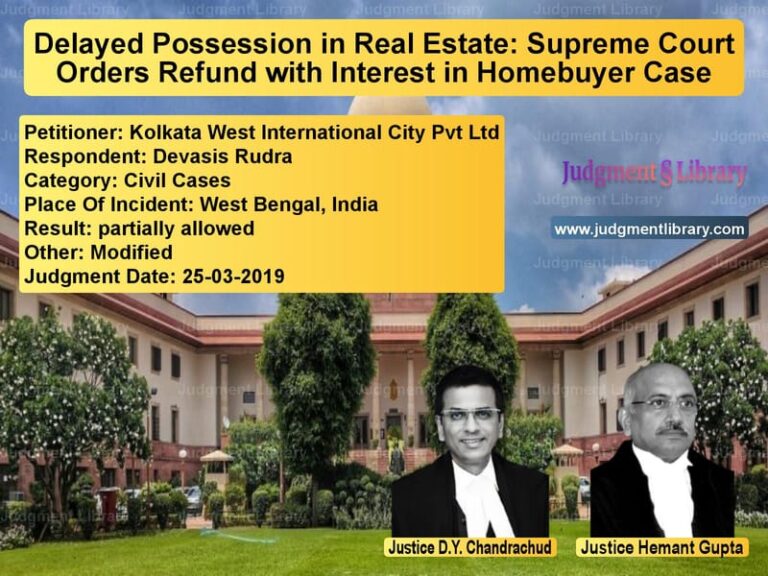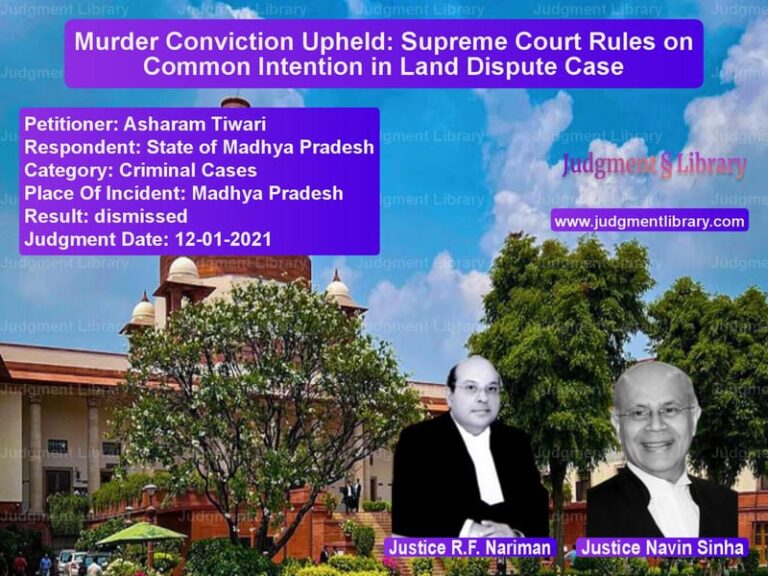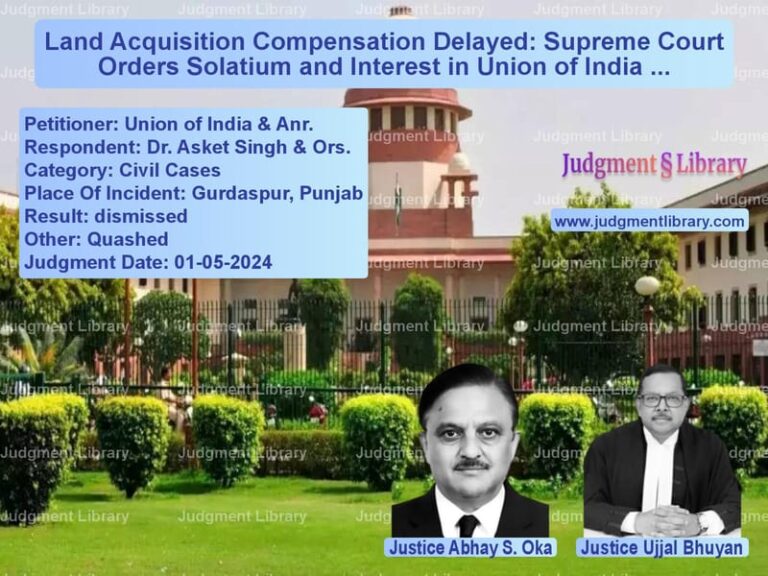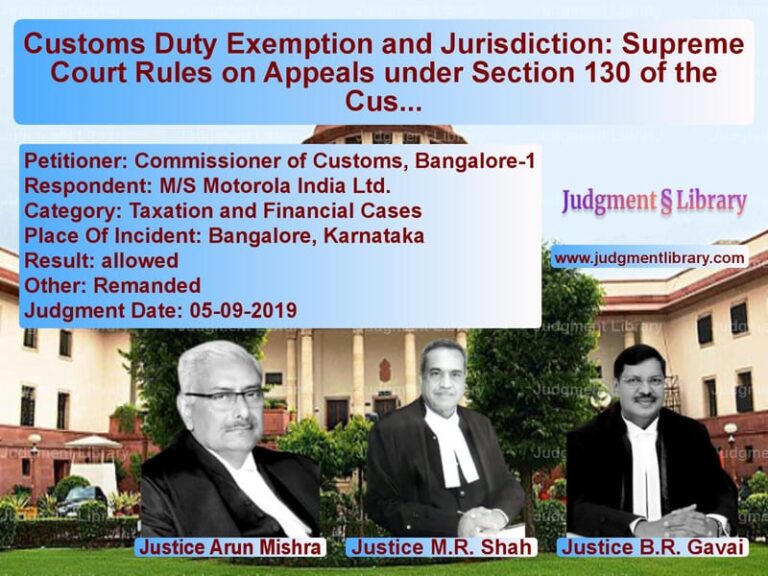Reduction of Sentence Under Abkari Act: Supreme Court Balances Justice and Leniency
The Supreme Court of India, in the case of Paul Kuriakose vs. The Excise Inspector & Anr., addressed the conviction and sentencing of the appellant under Section 55(a) of the Kerala Abkari Act. The Court’s decision focused on balancing the gravity of the offense with mitigating circumstances, leading to a reduction in the sentence imposed by the High Court.
Background of the Case
The case originated from the seizure of 450 liters of spirit from the appellant’s vehicle. The spirit was found to contain 80.70% ethyl alcohol, which violated the provisions of the Abkari Act, a law regulating the manufacture and sale of liquor in Kerala. The trial court found the appellant guilty under Section 55(a) of the Act, sentencing him to five years of rigorous imprisonment and imposing a fine of Rs. 5 lakhs.
The appellant challenged this verdict before the Kerala High Court, which upheld the conviction but reduced the sentence from five years to three years and decreased the fine to Rs. 1 lakh.
Appeal Before the Supreme Court
The appellant, dissatisfied with the High Court’s decision, approached the Supreme Court, arguing that the sentence remained excessive given the facts of the case.
Arguments by the Appellant (Paul Kuriakose)
- The appellant argued that he had no prior criminal record and was a first-time offender.
- He contended that the trial had been ongoing for over 15 years, causing him prolonged mental and emotional distress.
- The appellant submitted that the High Court had already recognized mitigating factors in reducing the sentence but had not sufficiently accounted for the prolonged nature of the proceedings.
Arguments by the Respondent (The Excise Inspector & Anr.)
- The prosecution emphasized that the appellant was caught transporting a significant quantity of illicit spirit, which posed serious risks to public health and law enforcement.
- They argued that the sentence was proportionate to the offense and necessary as a deterrent to others engaged in illegal liquor trade.
- The respondents contended that the Abkari Act prescribes strict punishment to curb the illicit liquor business and that leniency could undermine the law’s objectives.
Supreme Court’s Observations
The Supreme Court carefully analyzed the case records and the arguments presented by both parties. The Court observed:
- The conviction was based on strong evidence, as the seizure of illicit spirit from the appellant’s vehicle was well-documented and proved beyond a reasonable doubt.
- The High Court had already considered mitigating factors such as the appellant’s lack of prior criminal history and the long duration of the trial.
- Given that the occurrence was in the year 2000 and that the appellant had suffered the agony of a criminal trial and appeal for over 15 years, further reduction of the sentence was warranted.
The Court stated:
“Considering the mitigating factor that the appellant has no criminal antecedents and also the fact that the occurrence in question is of the year 2000 and the appellant has suffered the agony of criminal trial and pendency of appeal for more than 15 years, we are persuaded to further reduce the period of imprisonment from three years to rigorous imprisonment for two years. The amount of fine determined by the High Court as Rs.1 lakh along with the default clause is, however, left intact.”
Final Judgment and Its Implications
The Supreme Court allowed the appeal to the extent of reducing the sentence from three years to two years while keeping the fine amount unchanged at Rs. 1 lakh. The ruling reaffirmed the Court’s approach of ensuring that punishment is proportional to both the crime and the individual circumstances of the convict.
Conclusion
The Supreme Court’s ruling in Paul Kuriakose vs. The Excise Inspector & Anr. serves as an important precedent in sentencing jurisprudence under special laws like the Abkari Act. While upholding the conviction, the Court demonstrated judicial leniency in recognizing the prolonged duration of the case and the appellant’s lack of prior offenses. This judgment reinforces the principle that justice must be served while also considering individual circumstances, ensuring a balanced approach in criminal sentencing.
Don’t miss out on the full details! Download the complete judgment in PDF format below and gain valuable insights instantly!
Download Judgment: Paul Kuriakose vs The Excise Inspector Supreme Court of India Judgment Dated 18-03-2016-1741853941785.pdf
Direct Downlaod Judgment: Direct downlaod this Judgment
See all petitions in Bail and Anticipatory Bail
See all petitions in Fraud and Forgery
See all petitions in Attempt to Murder Cases
See all petitions in Judgment by Dipak Misra
See all petitions in Judgment by Shiva Kirti Singh
See all petitions in partially allowed
See all petitions in Modified
See all petitions in supreme court of India judgments March 2016
See all petitions in 2016 judgments
See all posts in Criminal Cases Category
See all allowed petitions in Criminal Cases Category
See all Dismissed petitions in Criminal Cases Category
See all partially allowed petitions in Criminal Cases Category

